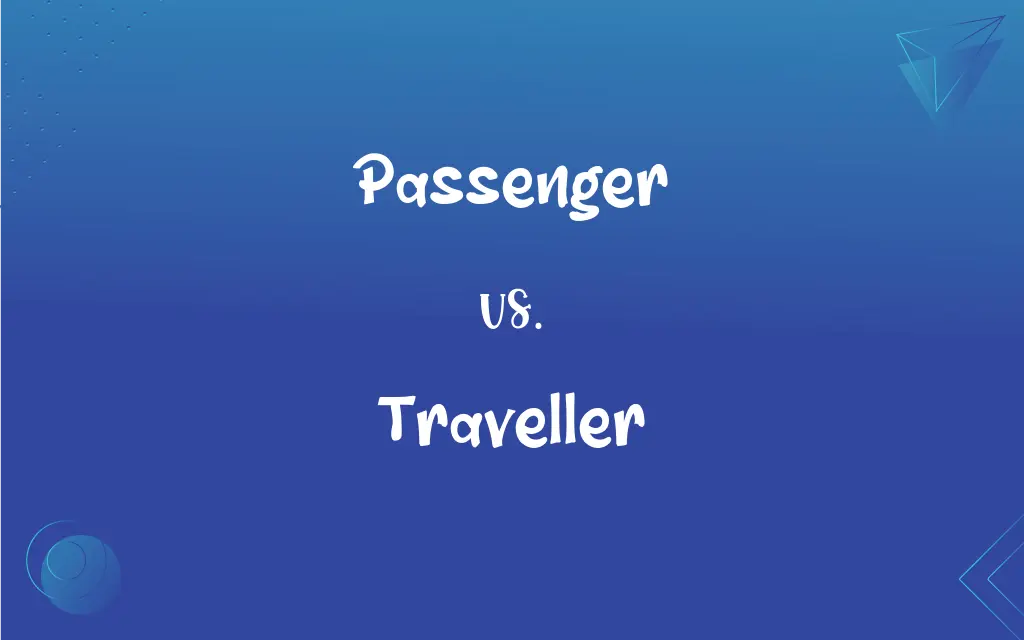Passenger vs. Traveller: What's the Difference?
Edited by Aimie Carlson || By Janet White || Updated on September 29, 2023
A passenger is someone traveling in a vehicle but not operating it; a traveler is someone who is making a journey, regardless of the mode of transportation.

Key Differences
Passenger and traveler are terms that often relate to the act of moving from one place to another, but they encompass different perspectives of travel. A passenger specifically refers to a person who is traveling in a vehicle, whether it be a car, bus, train, or airplane, without participating in its operation. A traveler, conversely, denotes a person who is on a journey, and it does not necessarily specify any mode of transportation. A traveler can be a passenger, but a passenger is essentially part of the broader category of travelers.
Understanding the context of passenger and traveler is crucial in the realms of transportation and tourism. The term passenger typically involves scenarios where the individual is not responsible for navigating the vehicle and is often subject to rules and regulations set by the carrier. In contrast, a traveler has a more generic implication, referring to someone who moves between different geographic locations, and can be applied more broadly to various modes and purposes of travel, not confined to being conveyed by a vehicle.
The distinction between passenger and traveler can be understood further by considering the purpose and nature of the journey. A passenger is usually more concerned with the conveyance and reaching the destination and may not be invested in exploring or experiencing different places. A traveler, however, usually embarks on journeys to explore, experience, or reach different destinations, and the essence of being a traveler is not just about moving, but about experiencing new environments, cultures, or places.
When considering the scope of travel and transportation services, passengers are the clients of specific transport service providers, while travelers are individuals who may use multiple modes of transport to fulfill their journey requirements. Passengers are more transient in their interaction with the journey and are mostly concerned with the means of reaching their destinations. Travelers encompass a wider spectrum, focusing on the journey's experiences and learnings and the destinations themselves.
In the industry of travel and tourism, recognizing the differences between passenger and traveler is vital for service providers. Services, experiences, and regulations are often designed considering whether the individual is a passenger requiring conveyance or a traveler seeking exploration and experiences. While the term passenger is relatively specific, the term traveler provides a more comprehensive view of an individual's journey, highlighting the experience and exploration aspects of travel.
ADVERTISEMENT
Comparison Chart
Definition
A person traveling in, but not operating, a vehicle.
A person who is making a journey.
Scope
Specific to being conveyed by a vehicle.
Broad, includes various modes and purposes of travel.
Purpose
Concerned mainly with conveyance to a destination.
Focused on exploration and experiences of the journey.
Responsibility
Subject to the rules and regulations of the carrier.
More autonomous in decisions related to the journey.
Role
A client of transport service providers.
An explorer, a visitor, or a tourist, depending on the context of the journey.
ADVERTISEMENT
Passenger and Traveller Definitions
Passenger
An individual conveyed by public or private transport.
The airplane had over 200 passengers on board.
Traveller
Someone who moves between different geographic locations.
The seasoned traveller had visited over fifty countries.
Passenger
A person traveling in a vehicle who is not controlling it.
The bus was filled with passengers going to the city center.
Traveller
An explorer who travels to experience and learn from different cultures and environments.
The inquisitive traveller immersed himself in the local culture.
Passenger
A person being transported from one place to another in a vehicle.
The passengers were instructed to fasten their seat belts.
Traveller
A person who goes on a trip or journey.
The traveller packed his bag for the upcoming journey.
Passenger
An occupant in a vehicle, other than the driver.
The passenger in the car was reading a book.
Traveller
An individual who explores different places, experiencing new environments and cultures.
The traveller shared tales of his adventures in remote villages.
Passenger
Someone who travels in a conveyance, such as a car or train, without participating in its operation.
The taxi driver picked up a passenger from the airport.
Traveller
One who travels or has traveled, as to distant places.
Passenger
A person who travels in a conveyance, such as a car or train, without participating in its operation.
Traveller
A traveling salesperson.
Passenger
(Informal) A person who participates only passively in an activity.
Traveller
A member of any of various groups of traditionally itinerant people living especially in Scotland and Ireland.
Passenger
(Archaic) A wayfarer or traveler.
Traveller
A metal ring that moves freely back and forth on a rope, rod, or spar.
Passenger
One who rides or travels in a vehicle, but who does not operate it and is not a member of the crew.
Traveller
The rope, rod, or spar on which such a ring moves.
Passenger
Somebody in a team who does not do their fair share of the work.
Traveller
A carriage that slides on a transverse track near the stern of a sailboat, providing an adjustable point of attachment for the mainsheet block.
Passenger
(falconry) A young hunting bird that can fly and is taken while it is still in its first year.
Traveller
One who travels, especially to distant lands.
Passenger
(obsolete) A migratory bird, a bird of passage.
Traveller
(dated) A salesman who travels from place to place on behalf of a company.
Passenger
(obsolete) A passer-by; a wayfarer.
Traveller
(British) Someone who lives (particularly in the UK) in a caravan, bus or other vehicle rather than a fixed abode.
Passenger
(obsolete) A ship carrying passengers, a ferryboat.
Traveller
(Ireland) Traveller
Passenger
A moth, Dysgonia algira
Traveller
A list and record of instructions that follows a part in a manufacturing process.
Passenger
(military) Any of the individual warheads of a MIRV missile.
Traveller
(electrical engineering) One of the wires connecting the two members of a pair of three-way switches.
Passenger
(intransitive) To ride as a passenger in a vehicle.
Traveller
(nautical) A metal ring that moves freely on part of a ship’s rigging.
Passenger
A passer or passer-by; a wayfarer.
Traveller
A rail or track for a sliding curtain.
Passenger
A traveler by some established conveyance, as a coach, steamboat, railroad train, etc.
Traveller
(bridge) A sheet of paper that is circulated with the board of cards, on which players record their scores.
Passenger
A traveler riding in a vehicle (a boat or bus or car or plane or train etc) who is not operating it
Traveller
A styrofoam cup filled with liquor and usually ice, to be taken away from a place.
Traveller
A person who changes location
Traveller
A person who is making a journey.
A lone traveller walked along the desert road.
FAQs
Can a traveller be a passenger?
Yes, a traveller can be a passenger when they use a vehicle as a mode of transportation.
What is the fundamental difference between a passenger and a traveller?
A passenger is someone traveling in a vehicle but not operating it; a traveller is someone on a journey, regardless of the mode of transport.
Is every passenger a traveller?
Essentially, yes, as passengers are traveling from one place to another.
Does the term traveller imply tourism?
Not necessarily, a traveller can be someone traveling for various reasons
Can a passenger drive a vehicle?
No, passengers are not operating the vehicle; the driver is not considered a passenger.
About Author
Written by
Janet WhiteJanet White has been an esteemed writer and blogger for Difference Wiki. Holding a Master's degree in Science and Medical Journalism from the prestigious Boston University, she has consistently demonstrated her expertise and passion for her field. When she's not immersed in her work, Janet relishes her time exercising, delving into a good book, and cherishing moments with friends and family.
Edited by
Aimie CarlsonAimie Carlson, holding a master's degree in English literature, is a fervent English language enthusiast. She lends her writing talents to Difference Wiki, a prominent website that specializes in comparisons, offering readers insightful analyses that both captivate and inform.































































